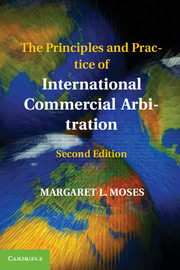Book contents
- Frontmatter
- Contents
- Preface to the Second Edition
- Foreword to the First Edition
- Chapter One Introduction to International Commercial Arbitration
- Chapter Two The Arbitration Agreement
- Chapter Three Drafting the Arbitration Agreement
- Chapter Four Applicable Laws and Rules
- Chapter Five Judicial Assistance for Arbitration
- Chapter Six The Tribunal
- Chapter Seven The Arbitral Proceedings
- Chapter Eight The Award
- Chapter Nine Attempts to Set Aside an Award
- Chapter Ten Enforcement of the Award
- Chapter Eleven Investment Arbitration
- Appendix A The United Nations Convention on the Recognition and Enforcement of Foreign Arbitral Awards (The New York Convention) (1958)
- Appendix B UNCITRAL Model Law on International Commercial Arbitration (original 1985 version)
- Appendix C Revised Articles of the UNCITRAL Model Law on International Commercial Arbitration (2006)
- Appendix D UNCITRAL Recommendation Regarding the Interpretation of Article II, Paragraph 2, and Article VII, Paragraph 1, of the New York Convention
- Appendix E IBA Rules on the Taking of Evidence in International Arbitration
- Appendix F IBA Rules of Ethics for International Arbitrators 1987
- Appendix G IBA Guidelines on Conflicts of Interest in International Arbitration
- Appendix H The AAA–ABA Code of Ethics for Arbitrators in Commercial Disputes
- Appendix I Model Clauses
- Appendix J Useful Arbitration Websites
- Index
- References
Chapter Six - The Tribunal
Published online by Cambridge University Press: 05 June 2012
- Frontmatter
- Contents
- Preface to the Second Edition
- Foreword to the First Edition
- Chapter One Introduction to International Commercial Arbitration
- Chapter Two The Arbitration Agreement
- Chapter Three Drafting the Arbitration Agreement
- Chapter Four Applicable Laws and Rules
- Chapter Five Judicial Assistance for Arbitration
- Chapter Six The Tribunal
- Chapter Seven The Arbitral Proceedings
- Chapter Eight The Award
- Chapter Nine Attempts to Set Aside an Award
- Chapter Ten Enforcement of the Award
- Chapter Eleven Investment Arbitration
- Appendix A The United Nations Convention on the Recognition and Enforcement of Foreign Arbitral Awards (The New York Convention) (1958)
- Appendix B UNCITRAL Model Law on International Commercial Arbitration (original 1985 version)
- Appendix C Revised Articles of the UNCITRAL Model Law on International Commercial Arbitration (2006)
- Appendix D UNCITRAL Recommendation Regarding the Interpretation of Article II, Paragraph 2, and Article VII, Paragraph 1, of the New York Convention
- Appendix E IBA Rules on the Taking of Evidence in International Arbitration
- Appendix F IBA Rules of Ethics for International Arbitrators 1987
- Appendix G IBA Guidelines on Conflicts of Interest in International Arbitration
- Appendix H The AAA–ABA Code of Ethics for Arbitrators in Commercial Disputes
- Appendix I Model Clauses
- Appendix J Useful Arbitration Websites
- Index
- References
Summary
Because arbitration is a private dispute resolution process lacking some of the safeguards of a national legal system, the quality of the tribunal has a significant impact on maintaining parties’ confidence in arbitration as a system that works. This chapter focuses on issues of the tribunal's appointment, qualifications, and duties – all of which bear on the integrity of the process and on the efficiency and effectiveness of the dispute's resolution.
APPOINTMENT OF ARBITRATORS
Choosing arbitrators who will preside over the proceedings and issue an award is perhaps the most important thing a lawyer does with respect to resolving the client's dispute. The skill, experience, and knowledge of the arbitrators will have a significant impact on the quality of the process and of the award. In addition, arbitrators are fundamentally more powerful than judges, because unlike judges, their decision usually cannot be overturned on the basis of fact or law. An arbitrator can misinterpret the law or make an egregious mistake based on the facts of the case, and counsel will generally be unable to vacate the award resulting from the mistakes. Thus, it behooves lawyers to plan carefully how they are going to select their decision makers.
- Type
- Chapter
- Information
- Publisher: Cambridge University PressPrint publication year: 2012



